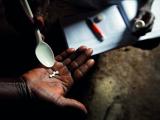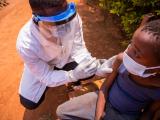Jan 14, 2011
Study: Airborne prions cause scrapie in mice
European researchers say they have found evidence that prions, the agents that cause the fatal brain diseases known as transmissible spongiform encephalopathies (TSEs), can spread through the air to infect animals. The TSEs include bovine spongiform encephalopathy (mad cow disease) and, in humans, Creutzfeldt-Jakob disease (CJD). Prions are known to be transmissible through contaminated food, blood, milk, saliva, feces, and urine, say Swiss and German scientists in a report in PLoS Pathogens. But to their surprise, they found that wild-type and transgenic mice efficiently contracted scrapie after exposure to aerosolized prions. Mice got sick after exposure to prion-tainted air for as little as 1 minute, and the longer the exposure, the shorter was the disease's incubation time, according to a press release from the University of Zurich. Prof. Adriano Aguzzi, senior author, said the findings were entirely unexpected. Transgenic mice that lacked certain immune cells also contracted the disease, which suggests that exposure to airborne prions "can lead to direct invasion of neural pathways without an obligatory replicative phase in lymphoid organs," the study says. The authors say their findings suggest a possible need for new safety regulations in labs, slaughterhouses, and animal feed plants, according to the press release. But Aguzzi said CJD patients do not exhale prions.
Jan 13 PLoS Pathog report
Jan 13 University of Zurich press release
FDA moves to shut down juice company for sanitation failures
The US Food and Drug Administration (FDA) has moved to shut down a beverage company in Jamaica, N.Y., for not having a contamination-prevention plan and not following good manufacturing practices for some of its juice products. The FDA said yesterday that the Justice Department, at the FDA's request, filed for a permanent injunction against Mystical One LLC for not using a hazard analysis and critical control point (HACCP) plan and not complying with current Good Manufacturing Practice (cGMP) for carrot juice and other products. FDA investigators found that the company failed to heat low-acid vegetable juices to destroy dangerous microbes, failed to clean surfaces properly, and failed to maintain and monitor sanitation conditions. The agency said it was not aware of any illnesses linked to the problems, but it said the kinds of violations it found could lead to Clostridium botulinum contamination in carrot juice. The FDA said the violations it found involved six brands: Fresh Carrot Juice, Magnum Food Drink, Pineapple Ginger Drink, Sorrel & Ginger, Sea Moss, and Peanut Punch. The FDA requires all juice processors to have HACCP plans and requires cGMP for all food processors.
Jan 13 FDA announcement
Malaria vaccine study shows 15-month protection in kids
A trial of a GlaxoSmithKline malaria vaccine in children in Kenya and Tanzania, where the disease is endemic, today showed sustained protection for 15 months. The research group published their findings in an early online edition of Lancet Infectious Diseases. A previous study showed efficacy against the disease after 8 months. Glaxo's vaccine is a recombinant antigen consisting of circumsporozite protein fused to the hepatitis B surface antigen. It includes a liposome adjuvant that contains immunostimulants MPL and QS21. The study included 894 children between 5 and 17 months old, of whom half got 3 doses of the malaria vaccine and half received a rabies vaccine. Efficacy of the malaria vaccine at 15-month follow up was 45.8%. No waning of efficacy over the study period was found. Researchers said the findings suggest that the vaccine is a promising public health intervention against childhood malaria.
Jan 14 Lancet Infect Dis abstract
Yellow fever vaccine arrives in Uganda
Uganda yesterday received its first doses of yellow fever vaccine, which will be deployed on Jan 22 in five districts most affected by the outbreak in the northern part of the country, AllAfrica news reported today. The country received 1 million doses, which will go to people older than 6 months in Abim, Agago, Pader, Kitgum, and Lamwo districts. The health ministry had originally said it needed 2.5 million doses to conduct a mass vaccination campaign in 26 northern districts. However, at a press briefing yesterday, Dr Issa Makumbo, assistant commissioner for national disease control, said the country will need more vaccine only if the disease is confirmed in five more districts where cases are suspected. The country is battling a 2-month-old yellow fever outbreak, its first since 1972. Authorities have confirmed 190 cases, including 48 deaths, according to the most recent update from the European Centre for Disease Prevention and Control
Jan 14 AllAfrica story

















